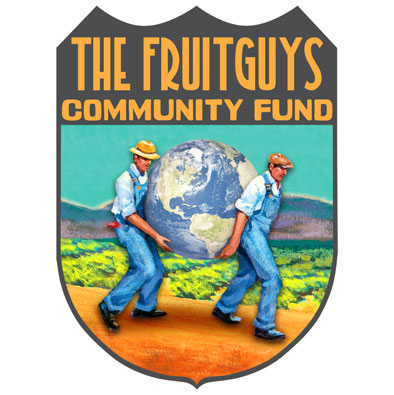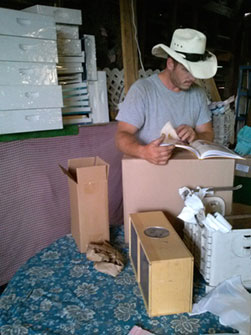Fresh Dirt
- By Sheila Cassani
- Last Updated On
- Reading Time: 5 mins.
 The FruitGuys Community Fund, a nonprofit fiscally sponsored project of Community Initiatives, awarded small farms and agricultural nonprofits $30,000 in 2014 for sustainability projects intended to have a positive impact on the environment, local food systems, and farm diversity.
The FruitGuys Community Fund, a nonprofit fiscally sponsored project of Community Initiatives, awarded small farms and agricultural nonprofits $30,000 in 2014 for sustainability projects intended to have a positive impact on the environment, local food systems, and farm diversity.
The recipients were chosen based on their proposed project’s scores in the Community Fund’s 2014 areas of focus: pollination, pest control, soil health, and low-income food access. The 2014 grantees represent family farms of different sizes and generations, as well as nonprofit organizations. Their projects range from beehive and bat box installations to the planting of pollinator hedgerows and installation of drip irrigation and hoop houses. Here are some updates from their final reports.
 2014 Grantees
2014 Grantees
Clear Spring Farm in Easton, PA; Bountiful Hope Farms in Monroe, WI; Real Food Farm in Baltimore, MD; Black Oaks Center for Sustainable Renewable Living in Pembroke, IL; Woodleaf Farm in Oroville, CA; Friends of Great Kids Farm in Baltimore, MD; Lagier Ranches in Escalon, CA; Gabriel Farm in Sebastopol, CA.
Want farm-fresh fruit?
We've got you covered.
Lagier Ranches in Escalon, CA, received a $2,500 grant to install native pollinator hedgerows along the border of a newly planted 39-acre almond orchard. The 4th-generation family farm has been certified organic since 1997 and their project will serve as a model for establishing native pollinator hedgerows in the area, educating fellow farmers and agriculture students.
Final report
“We’re beginning to see pollinators along the hedgerows! Our final plant list reflects a bloom time almost all year and the hedgerow was designed to include larger shrubs interplanted with understory plants. The shrub and understory areas will provide shelter for ground-nesting bees as well as toads and increased beneficial insect activity. There is a renewed interest and enthusiasm for California native plants due to their drought resistance and ability to provide food for our native pollinators. I can’t tell you how grateful I am to have been given the opportunity to not only add this diverse native habitat to our farm but to also, in the process, gain knowledge through the experience to help others seeking to add native hedgerows to their farms. I am looking forward to sharing pollinator knowledge!” —Casey Havre, farmer

Clear Spring Farm in Easton, PA, received a $4,000 grant for six beehives and equipment. The 23-acre farm has been in farmer Terry Kromer’s family since the 1930s. The bees will increase crop pollination, provide honey for their CSA, and implement educational opportunities for local students and visitors on the importance of honeybees in agriculture.
Final report
“The hives have been delivered and erected, but we do have to wait until April 2015 to receive our delivery of six packages of bees. We have been attending apiary meetings to ready ourselves for the upcoming season. This past fall, we introduced our customers to the up and coming pollination and the availability of honey to their CSA shares. We are looking forward to the long-term positive impacts of this project: super pollination as well as honey and honey products available for years to come.” —Terry Kromer, farm owner
Woodleaf Farm in Oroville, CA, received a $2,252 grant to document the biological and economic sustainability of agro-ecosystem farming techniques. Owners Carl Rosato and Helen Atthowe are leaders in farm design that suppresses pests, and soil management practices that improve plant health. For more information on their findings, view their recorded webinar: Building Pest-Suppressive Organic Farms: Tools and Ecological Strategies Used by Five Long-Term Organic Farms to Suppress Insects.
Want farm-fresh fruit?
We've got you covered.Final report
“We have a unique low-input nitrogen cycling and mineral balancing soil management system. This system works in a synergistic manner with the farm’s biological control pest management system and mimics nutrient cycling in a natural forest. With help from a The FruitGuys Community Fund grant in 2014, we looked more closely at yield, fruit quality, leaf nutrition, and soil health interactions in combination with weekly insect monitoring to evaluate whether or not this unique system is ecologically and economically sustainable. The data collected in 2014 (along with long-term farm records compiled as part of WSARE grant SW13-017) support our premise: This system with low nitrogen and low organic spray material inputs has resulted in good yields of high-quality fruit with acceptable (less than 10 percent) pest damage and lower labor costs.” —Helen Atthowe, co-owner

Bountiful Hope Farms in Monroe, WI, received a $2,750 grant to install a drip irrigation system, hoop houses, and raised beds on a three-acre farm that serves those in need. The nonprofit organization donates 100 percent of their produce to food pantries and a food bank in its local community.
Final report
“We installed the drip irrigation system throughout the entire garden as well as six raised beds and a hoop house. As expected, the impact of the drip irrigation system has been profound. It allowed us to expand the size of the garden and deliver high-quality produce to our client food pantries throughout the region consistently throughout the growing season. We were able to utilize our labor on weeding and harvesting rather than manual watering efforts. The hoop house and raised beds will allow us to begin donations much earlier than we have previously done. We broke our previous donation record, increasing to 8,900 pounds up from a previous high of 3,200 pounds. This exceeded our wildest expectations and gave us the nudge we need to keep producing at these high levels for years to come.” —Melissa Burch, founder and project manager
Friends of Great Kids Farm in Baltimore, MD, received a $5,000 grant to plant a nursery orchard of low-maintenance, schoolyard-growable fruit trees, brambles, vines, and shrubs in order to supply current and future school garden sites with stock for planting. The non-profit organization operates a 33-acre farm owned by Baltimore City Public Schools. Farm produce is used by city schools and sold to local restaurants.
Final report
“We designed the orchard, created swales to capture rainwater as it flows down the orchard slope, staked locations for 98 fruit trees and shrubs, amended soil, and planted 54 trees. The preparation and planting of the orchard was a deeply engaging learning experience for our high school interns, who worked with our farmer on plant selection, and traveled to the nursery to pick up a large order of trees. They had the opportunity to taste many of the fruits that will be produced by the orchard at the nursery, some of which were completely unfamiliar. Since then, many have expressed interest in learning more about fruit production and adding fruit to our farm-to-school program.” —Chrissa Carlson, executive director
Want farm-fresh fruit?
We've got you covered.Want to get more involved?
- Join our Volunteer Grant Review Committee. Help decide which projects get funded for 2015. For more information, please email volunteer@fruitguyscommunityfund.org.
- Sign up for The FruitGuys Community Fund newsletter.
- The 2015 Grantees will be announced in April 2015.
Sheila Cassani is The FruitGuys GoodWorks Ambassador.
Recent Articles
8 Avocado Varieties To Try (And When to Taste Them!)
When to Send Snack Care Packages to Employees: An HR Guide
The FruitGuys Delivers Fresh Groceries to 200 Federal Workers
Work Better With KiZE Bars: Clean-Ingredient Office Treats That Give Back
Farm-Fit Brings Fresh, Locally Sourced Produce to Campus
Subscribe to our Newsletter
"*" indicates required fields



